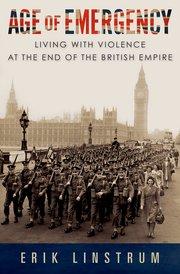Erik Linstrum ’06 Analyzes Violence in Imperial Britain After 1945
The Book: Analyzing the period after 1945 when uprisings against colonial rule broke out across the world, Age of Emergency (Oxford University Press), focuses on how violence was experienced in the lives of ordinary people in imperial Britain. Using various historical records including letters, television, newspapers, novels, and more, Linstrum uncovers the violent torture, executions, and gruesome punishments the community faced. Throughout his writing, Linstrum demonstrates the significance of war beyond the fight between soldiers, and the ways in which war encroaches on all aspects of life.
The Author: Erik Linstrum ’06 is a history professor at the University of Virginia. In addition to Age of Emergency, Linstrum is also the author of Ruling Minds (2016), and was awarded the George Louis Beer Prize by the American Historical Association for this work. He earned his bachelor’s degree from Princeton and his master’s and Ph.D. from Harvard, all in history.
Excerpt:
Out of Apathy
The poet Christopher Logue was a man of political passions. Deployed to Palestine with the British Army in 1946, he was imprisoned and discharged after a clumsy effort to pass identity documents to the Zionist insurgents fighting imperial rule. Back in London, he marched against the Suez invasion in 1956, the year he turned thirty years old, and then against nuclear weapons in 1958. When mobs attacked the black residents of West London for five consecutive nights that year, in what became known as the Notting Hill riots, Logue saw confirmation of his belief that “we are a racist, prejudiced nation.” But more than anything else in the late 1950s, he was appalled by the violence inflicted in the name of empire. “In Cyprus we are busy murdering,” he observed in 1956. The following year, he was horrified by the “annihilation of the Mau-Mau.” Logue attributed this brutality to the traditions of a state that has “thieved, raped, killed by fire, torture, and any means to hand in India, Malaya, Guiana, Nigeria, Rhodesia, and Ireland for almost 200 years.”
Along with playwright John Arden, director Lindsay Anderson, novelist Doris Lessing, theater critic Kenneth Tynan, and others, Logue moved in a bohemian New Left circle in London. Distaste for empire as an unholy alliance of capitalism and militarism was one of its lodestars. Inspired by a 1956 Daily Express story about a National Serviceman shot to death in Cyprus, Logue wrote a poem, “The Song of the Dead Soldier,” that he hoped would make “a potent attack on those who want to continue the murder and anxiety.” The poem juxtaposes the boilerplate rhetoric of imperial-military officialdom (“Must be kept calm, must be patrolled, / For outposts are the heart and soul / Of empire, love, and lawful rule”) with the fatal navieté of the conscript (“I did not know to serve meant kill, / And I did not see the captain fall, / As my life went out through a bullet hole, / Mother, I cried, your womb is done”). Logue printed and circulated 2,000 broadside copies of the poem with a polemical subtitle (“One Killed in the Interests of Certain Tory Senators in Cyprus”) and a ripped-from-the-headlines epigraph from an army commander (“I am only interested in dead terrorists”). Reclaiming the conscript’s death from the jingoism of the right-wing press, Logue portrayed it as the latest senseless episode in a cycle of violence driven by the British elite.
Most of what British people heard about brutality in colonial war did not come from impartial fact-finders but from radicals with agendas. Literary intellectuals like Logue and his friends represented just one subset of the wide and varied ranks of campaigners against colonial war, a universe that also encompassed African and Asian envoys, Christian pacifists, Communist apparatchiks, black and Cypriot migrants, university students, socialist internationalists, and trade-union organizers. Like Logue, some of these activists operated as publicists, experimenting with rhetoric and media to amplify opposition to war. Others acted as information brokers, collecting testimony and other forms of evidence from conflict zones. Together, they built a counter-narrative to the justifications for colonial war that were routinely trumpeted in Westminster, Fleet Street, and Broadcasting House. When condemnations of violence reached the same power centers—and they did, repeatedly, in the 1950s—the script most often originated with dissenters on the margins.
If this achievement has not always been recognized, one reason is that activists themselves judged their efforts harshly. As one Labour organizer complained at the height of the unrest in Cyprus in 1957, “We run meetings all right, but nobody turns up. Have you ever tried protesting to an empty hall?” New Left activist and sociologist Peter Worsley complained that anticolonial campaigns struggled to convene “public meetings of hundreds while people gaze at [the ITV game show] Criss Cross Quiz in the millions.” Worsley concluded that the spectacular inhumanity of the Holocaust and Hiroshima had desensitized observers and left them “inured” to the quotidian abuses of empire. That, Worsley thought, is why the murder of eleven Africans by guards at a detention camp in Kenya—the infamous Hola Massacre of 1959—failed to provoke greater outrage. “To a generation reared on paperback horrors of the concentration camp,” he wrote, “another eleven make little impact.” The general election of 1959, which returned the Conservative government responsible for Hola, Cyprus, and Suez with a comfortable majority, seemed to offer little hope for a reckoning with the brutality of empire. Another New Left intellectual, E. P. Thompson, drew a similarly bleak conclusion about domestic resistance to colonial war. Looking back in 1963, seven years after his break with the Communist Party of Great Britain, Thompson observed that the Cold War froze left-wing activism just as the wars in Malaya, Kenya, and Cyprus were heating up. Propaganda and paranoia divided the socialist movement; those who decried empire most vocally were tainted “by their complicity with Stalinism.” In Thompson’s view, Communists themselves made matters worse by following Moscow in the prioritization of antiAmericanism over decolonization. The anticolonial tradition became “formal and ritualistic,” indulging in symbolic gestures that masked the “enfeebled” state of popular engagement. According to Thompson, it was only after 1956 that the global conscience of rank-and-file leftists reawakened, and even then, nuclear weapons and apartheid took precedence over the violence committed against British colonial subjects.
The apathy of the masses was a perennial concern for the left. Activists’ hope in the 1950s, that exposing the brutality of colonial war would inspire a collective repudiation of it, was not vindicated by events. Even so, campaigners accomplished more than they realized. They showed it was possible to dissent from the violence of empire. They created spaces— physically and metaphorically, in print and in speech, in private and in public—where events in the colonies were treated as moral emergencies that demanded a response. In meeting halls and city squares, in letters to newspapers and politicians, in student unions and conscientious objector tribunals, some said: not in our name. Amid all that has been written about the undeniable fractures, the contradictions, and the paternalism that afflicted resistance to empire, it is significant that this alternative path existed at all. Acquiescence in colonial violence was neither universal nor inevitable. It was a choice.
Excerpted from Age of Emergency by Erik Linstrum . Copyright 2023. Published with permission of the author.
Reviews:
"Age of Emergency is a masterwork of a new Imperial history which stares unblinkingly into the violence of colonial rule and exposes how that horror reached deeply into twentieth-century British life. Linstrum's achievement is to show that the end of empire in Britain was no less a domestic trauma than in France: British decolonization did not happen 'in a fit of absence of mind.'" -- Richard Drayton, King's College London
"A sweeping, meticulous account of the reckoning with colonial brutality in post-war Britain. What happened in Kenya, Malaya, and Cyprus, Linstrum establishes beyond a doubt, was no secret back home. Age of Emergency masterfully explains how democratic publics come to live with-even to embrace-the violence done in their name." -- Deborah Cohen, Northwestern University











No responses yet